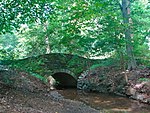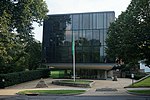Center for Hellenic Studies

The Center for Hellenic Studies (CHS) is a research institute for classics located in Washington, D.C. at 3100 NW Whitehaven Street. It is affiliated with Harvard University. Nestled in Rock Creek Park behind Embassy Row, the Center for Hellenic Studies offers a variety of both residential and remote fellowships each year to scholars and researchers working on projects in a variety of fields, including "archaeology, art history, epigraphy, history, literary criticism, philology, philosophy, pedagogical applications, reception, and interdisciplinary studies". The center provides housing for "residential" fellows and their families, and accommodates remote fellows and visiting scholars during shorter stays. Fellows are selected by a panel of Senior Fellows, a group of five internationally selected senior classicists. Fellows are typically pre-tenured PhDs from around the world, most often from Europe or North America. The "Center", as it is commonly called, has been a stopping point in the careers of many budding classicists who have gone on to be major contributors in the field.
Excerpt from the Wikipedia article Center for Hellenic Studies (License: CC BY-SA 3.0, Authors, Images).Center for Hellenic Studies
Whitehaven Street Northwest, Washington Georgetown
Geographical coordinates (GPS) Address Nearby Places Show on map
Geographical coordinates (GPS)
| Latitude | Longitude |
|---|---|
| N 38.9176 ° | E -77.062 ° |
Address
Whitehaven Street Northwest 3100
20008 Washington, Georgetown
District of Columbia, United States
Open on Google Maps










